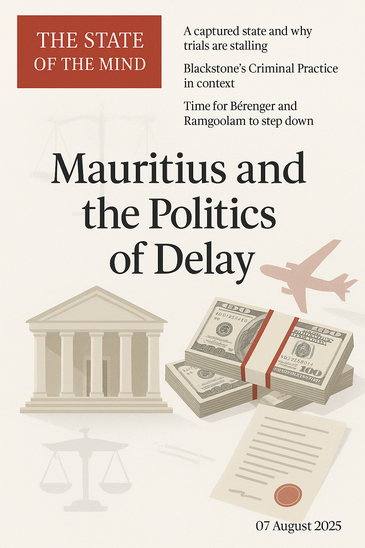Institutional Capture
By Vayu Putra | The State of the Mind
The procedural dynamics in this case are inseparable from the structure of Mauritius’s governance. The Attorney General, who oversees legislative drafting and legal policy, previously acted as the Prime Minister’s defence counsel in the same matter. The board of the Financial Crimes Commission (FCC), which was created to consolidate anti-corruption functions, is appointed entirely by the Prime Minister. Similar appointment powers extend to other oversight bodies, including those with investigative or prosecutorial authority.
This concentration of influence over institutions that are nominally independent complicates enforcement in politically sensitive cases. It also contributes to the perception of asymmetric justice: the same principle that exhaustive particulars are unnecessary is applied routinely to less prominent defendants held under provisional charges, often for extended periods, while investigations proceed. In contrast, in high-profile cases the principle is challenged, re-litigated, and used to justify repeated delays.
International Regulatory Context
Mauritius’s legal handling of politically exposed persons (PEPs) remains under scrutiny by the Financial Action Task Force (FATF), the global standard-setter for anti-money laundering and counter-terrorist financing (AML/CFT). The country was greylisted in 2020 after deficiencies were identified in the investigation and prosecution of complex money-laundering cases. Removal from the list in 2022 followed legislative reforms and institutional restructuring, but Mauritius remains on the FATF’s “enhanced follow-up” list.
Two FATF recommendations are particularly relevant here. Recommendation 4 requires jurisdictions to have effective mechanisms for the confiscation of criminal proceeds, including through NCBF. Recommendation 12 imposes enhanced due diligence for PEPs, recognising the elevated risk of corruption and illicit enrichment. Failure to enforce these standards consistently, especially in cases involving the highest office-holders, could trigger renewed scrutiny.
Beyond the FATF, the UK’s National Crime Agency (NCA) has investigated procurement transactions involving Air Mauritius and Airbus, while the US Federal Bureau of Investigation (FBI) has jurisdictional interest in the US$2m in uncirculated dollar bills, given America’s extraterritorial AML statutes and dollar-clearing system oversight.
Sectoral Economic Impact
The risks from legal inertia are not confined to governance metrics. Mauritius’s economic model depends on perceptions of stability and regulatory reliability. The offshore financial sector, accounting for around 11% of GDP, serves as a conduit for investment flows into Africa and Asia. This sector relies heavily on correspondent banking relationships (CBRs) with institutions in the United States, United Kingdom, and European Union.
If international confidence erodes, de-risking by foreign banks could reduce or sever CBRs. The IMF has documented how such losses in small island economies raise transaction costs, constrain trade finance, and push some cross-border payments into less regulated channels. In Mauritius, this would affect not only the offshore sector but also exporters of sugar and textiles, who rely on secure USD/EUR payment channels, and the tourism industry, which depends on smooth foreign exchange transactions for high-spending visitors from Europe and Asia.
Tourism, which contributed approximately 23% of GDP in 2024, is particularly sensitive to reputational risk. While leisure visitors may be less attuned to FATF monitoring lists, business and conference travel often involves corporate compliance checks. A renewed greylisting could deter certain categories of visitors and investors.
Foreign direct investment (FDI) flows — US$4.5bn in 2024 according to World Bank data — also depend on Mauritius’s continued reputation as a jurisdiction that meets OECD and FATF standards. Any signal that enforcement is selective could slow inflows, particularly in services and real estate, where compliance checks are integral to cross-border transactions.
Comparative Patterns
Mauritius’s procedural delays mirror patterns seen elsewhere. In South Africa, former President Jacob Zuma employed what became known as the “Stalingrad defence” — a strategy of challenging every procedural step to delay corruption trials for years. In Brazil, the “Lava Jato” investigations demonstrated how asset recovery can proceed alongside, or in lieu of, criminal convictions, with political fortunes shifting in the interim, as seen with Luiz Inácio Lula da Silva. Smaller island jurisdictions such as Seychelles and Cyprus have also faced external banking restrictions after high-profile failures in AML enforcement, underscoring the potential economic costs of reputational damage.
Scenario Outlook
Best case: The criminal trial proceeds on the merits, resulting in a conviction or acquittal based on evidence, with any unexplained assets recovered under NCBF provisions. This outcome would reinforce FATF compliance, maintain correspondent banking ties, and reassure investors.
Base case: Procedural delays continue, but civil recovery proceeds under the Vivien precedent. While reputational damage is limited, the perception of selective justice persists domestically. Offshore sector growth slows marginally as some CBRs tighten due diligence.
Worst case: The trial collapses on procedural grounds and no civil recovery is pursued. FATF re-lists Mauritius for strategic deficiencies. Correspondent banking relationships are reduced, raising transaction costs and eroding competitiveness in offshore services, trade, and tourism. GDP growth slows by an estimated 1–1.5 percentage points over the medium term, based on IMF sensitivity analyses of de-risking impacts.
The 7 August hearing illustrates how the pace of high-profile prosecutions in Mauritius is shaped less by evidentiary readiness than by the interaction of political power, legal procedure, and institutional design. The law, as interpreted by the Supreme Court, does not require the particulars now being demanded. The precedent in Vivien makes asset recovery possible regardless of a criminal conviction. Extended procedural exchanges serve only to defer substantive adjudication.
Mauritius’s economic resilience depends on more than legislative compliance. In a global environment of heightened scrutiny of offshore centres, the combination of unresolved allegations at the highest political level, repeated procedural adjournments, and concentrated control over enforcement bodies risks undermining its hard-won credibility. For a small, open economy integrated into international finance and trade, the cost of delay is not merely reputational — it is structural.
